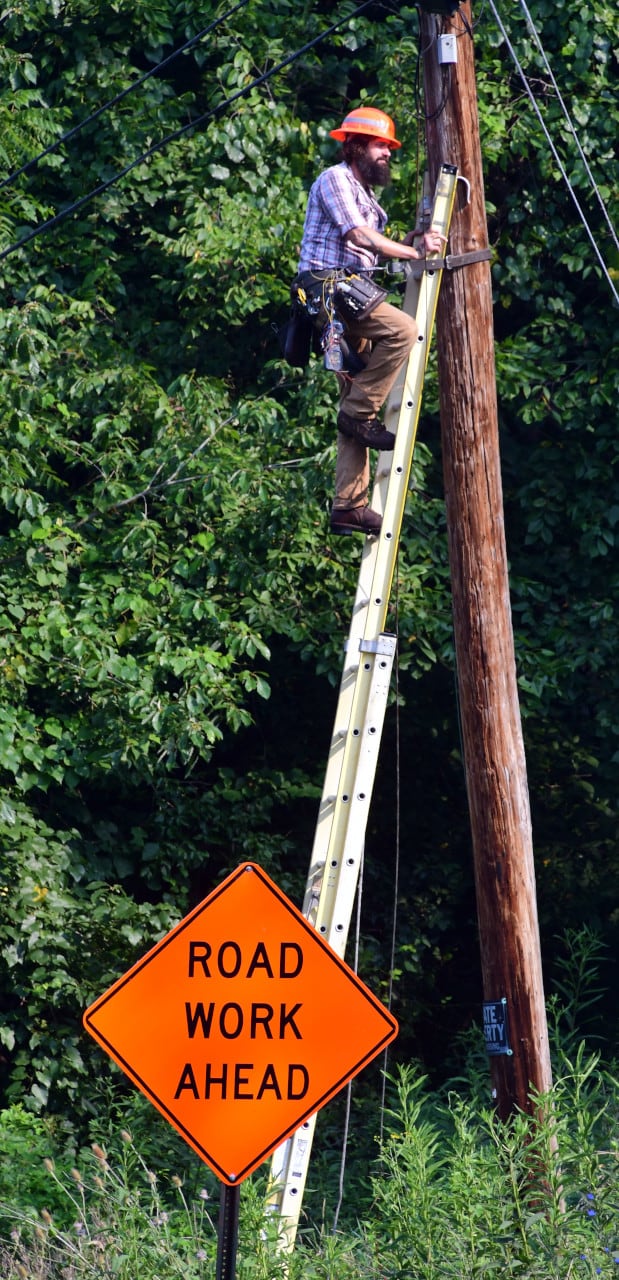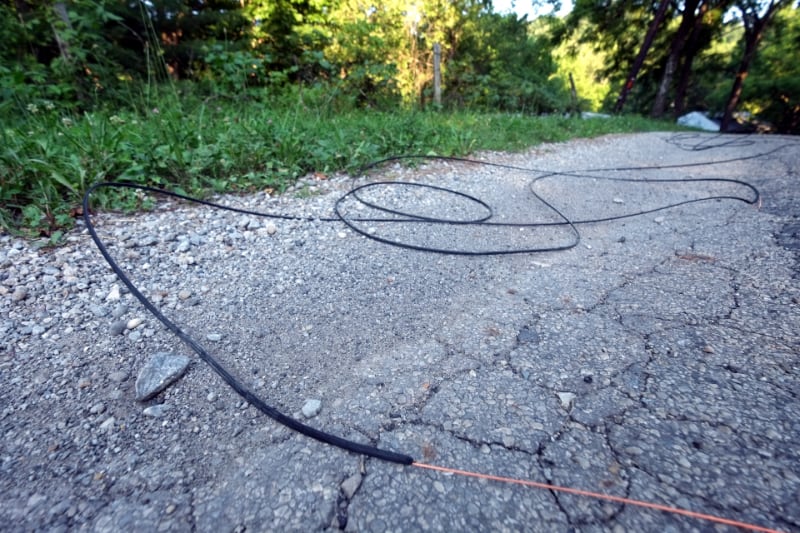
It is my fervent hope that Our Lord’s admonition to love our enemies does not apply to corporations. If it does, I’m sunk.
There are things I hate as much as I hate the entity that calls itself Frontier Communications, but there is nothing that I despise more. I suspect that the company is corrupt; I know it is incompetent.
Here’s the latest horror story involving a company that has received millions of your tax dollars over close to a decade to do good deeds that best I can tell remain undone. Ten days ago, a thunderstorm came through the area. As is common, it took out electricity, internet, and telephone service.
Not long ago, even if the electricity went down internet and phone service would remain, as long as there was juice to the router. Indeed, I got a dedicated uninterruptible power supply for the router, so I would have internet hours after electric service failed. But a few months ago Frontier “improved” their “service” and now when the power goes, so do the phone and internet. Where I live that’s serious because, lacking cellular coverage, when internet and phone are down there is no communication with the outside world. It’s funny how emergencies and lack of power often coincide, especially here in the Midwest. I’m in a big boat filled with millions of people.

American Electric Power got the electricity flowing within 10 hours. Frontier Communications took its usual casual approach. The internet came back — for a few minutes. Then it went down. Then it came back, then went down again. This was the pattern for days. And there was no place to turn for assistance.
When it first took over from Verizon here probably a decade ago, Frontier was a good and helpful company, one that seemed to understand the vendor-customer relationship. Then bad things began to happen. First, it sent notice to its customers that it had farmed out all their email to an unholy alliance of what was left of Yahoo, the desiccated carcass of AOL, and Verizon, who were operating together under the name of “Oath.” The notice said, in part — read it closely; accents are mine — “We’ve updated some of the ways we collect and analyze user data in order to deliver services, content, and relevant advertising to you and protect against abuse. This includes: Analyzing content and information (including emails, instant messages, posts, photos, attachments, and other communications) when you use our services. This allows us to deliver, personalize and develop relevant features, content, advertising and services[.] Linking your activity on third-party sites and apps with information we have about you[.]”
In short, they were now going to keep track of everything we said and had said to us in email or any other online medium, view our photographs, follow the websites we visit, and sell the information it gathered. That notice arrived a few minutes before 6 p.m. on April 17, 2018. Before noon April 18 I was doing my email via the excellent and private ProtonMail service, (which encrypts everything, so lotsa luck, “Oath”) and soon thereafter I was using the ProtonVPN service as well, which also encrypts everything.
Soon after that assault on subscribers’ privacy, Frontier’s tech support departed these shores for the Indian subcontinent. Calls to it, which were becoming increasingly necessary, were all handled by people whose accents were so heavy one sometimes had to ask for someone else with whom to speak because they could not be understood. While I’m not (yet) prepared to accuse the company itself of anything forbidden by law, I remember the day in which one of their customer “service” people told me he could double my internet speed for only a dollar extra a month. Sounded interesting. Then he began asking for information — beginning with my name, date of birth, and Social Security number! These are things a person needs to bring about an identity theft scam, not faster internet. I did not provide the information, but I wouldn’t be surprised if some people did and, who knows, maybe still do, and if they did they might wonder about all the bills they’re getting for purchases they never made. And this was from an official representative of the friggin’ phone company, which enjoys a government-granted monopoly!
But for the company’s history of what appear to be swindles by their “customer service” people (and, well, yes, by the company, if taking money from the government for work not done counts), I’d write off their ineptitude as the unhappy product of overarching idiocy. Here’s an example: if you have a problem with your phone and therefore go someplace else to phone them to report the trouble, the recorded pseudo-human voice instructs you to go back home and call them from the phone that is out! When you phone them about something else and (as seems always the case) there are hundreds and hundreds of callers ahead of you to talk to the hard-to-understand person in some distant locale who is “customer service,” you’re offered the chance to arrange for them to call you at a more convenient time (for them). But the voice prompts refuse to take input, so you hear the same recording over and over until in a rage you hang up (if you’re self-controlled). And in the event you do get a real human on the other end of your call, you will learn nothing as that person reads a script to you. Indeed, Frontier appears to be anti-religion, inasmuch as it causes its customers to entertain doubt: Is the Almighty Himself asleep at the lightning switch?
Across the street from my house, the phone line droops down to within four feet of the ground. The company knows about it and has since early 2021, when they strung it that way after it, already strung too low but not that low, had gotten yanked down by an overloaded logging truck, because, in the words of their technician, “I’ll come back and fix it when I get my bucket truck back.” Apparently Frontier did not respond favorably to his request for a truck and my phone line remains a dangling hostage. Meanwhile, it gets tangled in mowers and branches and will come down again. When it came down the first time it took me two hours to explain to the far-away man what a telephone line is and no, it is not part of my house.
That time, I drove around until I found a phone truck. It was operated by the local Frontier repairman, a genial fellow in the unenviable position of being the public face of this miserable corporation. He gave me his cellular phone number. I have not abused it, but after two days of trying last week to get satisfaction by the approved method, I gave him a call.

Yes, he said, there were problems in the area and they were working on them. But I would still have to “put in a ticket” via wherever in south-central Asia their “customer service” is. I called and after only about five minutes I was told there is no problem in my area. Then I was told to stand by my router — fat chance of that; I was a quarter-mile away, up a tall hill, the nearest cellular service. They were going to conduct a test. After a couple of minutes the recording came back and said there was an issue. So now Frontier knew about the problem. And indeed the internet came back for about five hours. Then the whole business started all over again.
So the next day, with the periods of service growing shorter and shorter — usually no more than two or three minutes — I climbed back up the hill. The temperature and humidity were both around 90. It is a steep hill and the excursion was not pleasant. This time I was determined to speak with an actual person. Unsurprisingly, I was told the wait time was 10 minutes. Twice during the next 15 minutes the terrible music was interrupted by a recording encouraging me to arrange for them to call me back on my nonfunctioning phone line. Then they just hung up on me.
During one of the brief periods of service, I found an ad on Twitter for Frontier’s remarkable internet service. I responded to it in a public reply: “Guys, your internet service generally sucks. Small storm here three days ago. Power back in a few hours. Frontier fiber internet on for \~10 minutes, off for \~30. For three days. You accepted the money but didn’t do the work.”
Accepted the money? Yes, from 2015 to 2021, the federal government gave it more than $234 million (some of which time the company spent in bankruptcy, though that didn’t stop it from awarding its executives nearly $38 million in bonuses in 2020, during the bankruptcy). They were given the money under the pretense of providing broadband to rural areas. (They have been given more since; $440 million was reported just this January.) In 2021 it told the government that, well, no, it hadn’t actually done all the work, you know, but there’s a contract provision that gives it an extra year to get around to it. Last year, they got in trouble for claiming higher internet speeds than they delivered. In a just country they would have been executed by now (though not hanged from my phone line, which would just limit the area where they could walk around).
The next window of internet service after my Tweet I got a message from Frontier, asking me to send them a direct message with the details. Which I did, sending it in the brief period of service after that. Then came a back-and-forth of messages from someone who identified himself as Rob and said they would get right on it at their first available moment, which it turned out would be five days later.
The internet came back on Friday. Frontier, or someone claiming to be from Frontier, phoned me before 7:30 a.m. Monday and asked if my phone service had been restored. Having been up very late, I remember the conversation groggily, but he said something about an “intermittent rectifier.” At that moment I thought of something he could put in his rectifier, and it wouldn’t have been comfortable. Or intermittent.
They get away with it. I suspect — just a suspicion, mind you — that this has to do with some of the money that was sent from Washington having been returned to Washington by a nonstandard route.

They are a monopoly. They have no competition.
If you’re lucky, you attended elementary and secondary school when students in those places would learn actual facts: History, civics, and how to read, write, and do arithmetic, as opposed to the indoctrination now provided by the Socialist Teachers Revolutionary Sisterhood or whatever they call it. And if you are one of those fortunate people (of whom there are, as they say, damn few left), you learned about effective punishment once administered to malefactors of many sorts. This included something called “the stocks.”
These were placed in a public location, typically a town square. These comprised boards making a vertical rectangle, hinged to bisect holes of a diameter that would admit, respectively, a person’s neck and wrists — sometimes their ankles as well. A criminal would be placed in the stocks, the hinged boards would be closed and locked, and there the convict would contemplate his or her crimes, sometimes assisted by helpful passersby who would fling rotten vegetables, manure, even things more substantial. The bad guy would endure public humiliation and more.
I’ve long thought that this practice should be revived for punishment of certain classes of individuals. It seems just the right way to punish acts of vandalism and the like, for instance. The graffitist who did a week in the stocks would be less inclined to repeat his offense.
After the last couple of weeks and much careful thought I’ve included that the class of criminal punished by a length of time in the stocks should be expanded to include Frontier Communications executives. The fact that there still are any Frontier Communications executives instead of smoking scorch marks where once they stood confirms our Creator’s wisdom in denying me control over lightning.
I’m reminded of the excellent (though dated) 1967 movie, “The President’s Analyst.” This was an era when the Bell Telephone Company produced all kinds of slick documentaries and program-length commercials, the hero of which would be the Bell Telephone Company. Some of the movie was done in this style. At the end we learn that the source of villainy in the world is “TPC,” The Phone Company.
And I’m reminded of a 1976 Lily Tomlin skit on “Saturday Night Live.” It ends with a slogan as true for today’s Frontier as it was true then: “We don’t care. We don’t have to. We’re The Phone Company.”

Dennis E. Powell is crackpot-at-large at Open for Business. Powell was a reporter in New York and elsewhere before moving to Ohio, where he has (mostly) recovered. You can reach him at dep@drippingwithirony.com.
You need to be logged in if you wish to comment on this article. Sign in or sign up here.
Start the Conversation